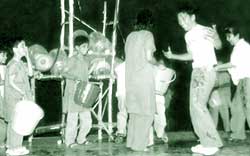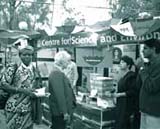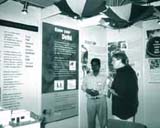| |
A NEW BEGINNING |
|
| Forging
ties
|
||
WATER LITERACY |
||
| Informing
people Water play The facilitator Water Gala |
||
| IN FOCUS | ||
| Faulty
perceptions Thirst rises, patience evaporates |
||
| Eviction
ordered Join the BIG fight Citizens pick up cudgels Solar lakes |
||
| WATER MANAGEMENT | ||
| South
India: Searching for an identity Thailand: Then came progress.... |
||
INITIATIVE |
||
| An eye
opener Naudihi’s revival Tankas of Badi Ghodan Dialogue |
||
CSE'S LATEST DESIGNS |
||
| Sri
Aurobindo Ashram’s system |
||
TECHNOLOGY |
||
| Rice
husk ash filter Clay pot irrigation |
||
| JAL YODHAS | ||
| Sachidanand
Bharti Madhu Bhatnagar |
||
TRADITION |
||
| Naullahs
of Kumaon |
||
WATER IN NEWS |
||
| Kerala,
building up its jalanidhi Schemes or scams? |
||
GREEN WATER HARVESTER'S NEWS |
||
| Saving
lives Rain associations Review |
||
CLASSROOM |
||
| Drop by
drop Water scramble |
||
FUNDING AGENCY |
||
| Oxfam
and water |
||
| 100
promises, deadline 2006 The landmarks Changing currents |
||

Vol.
5
No. 2
April-May 2003

Water plays
 |
A Lively and educative way to create awareness |
Don’t care don’t care....
From the back of the stage a group of kids are silently whispering these lines. One sees a
group of dancers moving like waves together in a beautiful water ballet. But then enters
Dr Don’t Care. And, the problems begin. Scarcity and pollution surfaced. The two
charming presenters of the show, Tulu and Lulu, wonder desperately. They start to ask
audience for help to throw Dr Don’t Care out .....’
The above scene is from ‘Water, a celebration of life’, a play organised by Hydrology Project, as part of the Jal Utsav (water festival) in Delhi. Over 90 kids from two Delhi-based NGOs Ritanjali and Deepalaya gave a powerful performance exploring various dimensions of the water problem in India. This visual treat was facilitated by a Netherlands-based NGO, Theatre Embassy, working primarily with the children and teachers.
Theatre, dance, music and visual art have been effectively used by a number of non-governmental organisations to create awareness on complex issues that affect the people in both rural and urban areas. This medium makes us aware of the impact of our behaviour on our environment.
Another Delhi-based NGO, Nectar, has also been working in this field. By organising street plays on water in Wazirpur J Jcolony, the message has been conveyed. People’s behaviour has changed and they have started using it wisely. Over the years, Nectar has given several performances by mobilising the local people and resources.
Evidently, creative art is a simple, funny, yet powerful medium to sensitise people about the most complex issues.
How aware are the delhiites?To find an answer, a survey was conducted by CSE. Questioning about 510 citizens, who came to ‘Nature Bazaar’, a 15-days long fest organised by Dastkar, a New Delhi-based NGO, at Dilli haat.
|


